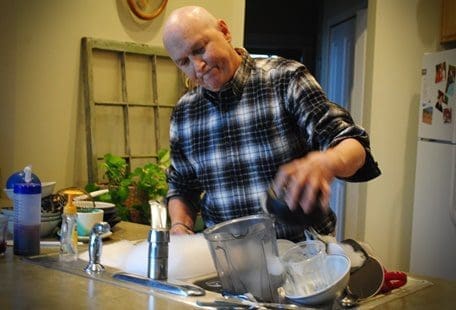About the time Hubby’s cancer was taking a sharp left turn, I was scheduled for head surgery — as in, remove portion of skull, push brain aside, untangle some things.
Up until that time, I had won our household’s “Caregiver of the Year” award eight years in a row. But now there was a new contender on the scene.
The 2013 nominee accompanied The Patient (that would be me) to physician appointments, picked up prescriptions and made sure The Patient took her meds. He did laundry, cooked and washed dishes.
He ran errands, fetched Chai tea and allowed The Patient to lounge around in pajamas as long as she wanted. All this while undergoing chemotherapy himself, some days worse than others.
Needless to say, Hubby won the 2013 “Caregiver of the Year” award. A unanimous decision by the committee (I am the committee).
I’m happy to report that Hubby and I both managed to survive this taking-care-of-the-caregiver phase. And that I won the COTY award for 2014.
There are some things I did well in walking beside Hubby on our cancer journey. And some things I didn’t do so well.
Here’s where I could have improved:
1. Curb complaints. Although I had an exceptionally rewarding job as Survivorship Coordinator in the St. Charles Cancer Center, I occasionally brought work-related complaints home. And Hubby, being the uber-responsible guy he was, took my unhappiness upon himself.
Be careful of your complaints; sometimes they can be taken personally by the patient, when that isn’t what you intended.
2. Determine a schedule. I was still working when Hubby’s cancer started growing stronger. He was home alone all day. And even though I begged off job-related weekend fundraising events, there were still evening and other weekend duties. I left him alone too frequently.
I finally got permission to work mornings from the office, and afternoons from home. Which morphed into working full-time from home and going to the office for meetings. Until it was time to utilize FMLA.
P.S. In determining a schedule that works for the patient, make sure the caregiver is also taking care of her/himself, which is a critical point in effective caregiving.
3. Do no bodily harm. I realize this should go without saying. But in case there are other caregivers as clumsy and forgetful as I …
There was a time when swelling prevented Hubby from reaching his toes. I volunteered to clip his toenails. I may have accidently clipped the top of a toe.
And I may have forgotten to hook him back up to oxygen after helping him to the bathroom. You can see why he wouldn’t let me anywhere near to administer daily shots when his blood therapeutic levels were being tweaked.
On a more positive note, I did make it through one night dispensing morphine through Hubby’s port every few hours. This without bodily harm to the patient.
Believe it or not, there were some things I did well as a caregiver — not perfectly all the time, but with set intention:
1. Speak words of reassurance. Over and over, I reassured Hubby of how much I loved him, that he was no burden to me, that I didn’t want to be any other place but there beside him. Over and over.
2. Downplay the humiliation. There were times we had to change bedding and clothing and diapers. You can imagine the humiliation. Tasks that could potentially humiliate the patient were done with kindness, with conversation instead of awkward silence, reassurance of love through words and affectionate touches. And no deep sighs. In caregiving, no deep sighs allowed.
3. Change speeds. I am guilty of being the world’s most proficient list-maker. Which allows me to check things off and see — by the number of checkmarks — how valuable I am. Which is ridiculous. But this is me sometimes.
As Hubby started slowing down, I set aside projects and lists. We took slower walks together. Played Words with Friends. Sat in lawn chairs in Drake Park. I read more and knitted more — anything I could do in the same room as he dozed off and on.
Adapt the speed of your lifestyle to the patient’s. I don’t regret a single slowing-down day. (Although he did once complain there were too many RPMs in the room when the hospice nurse and I were trying to explain something to him.)
As caregivers, there will be times of failure and times of success. And sometimes the failures will seem so much larger than the successes.
Stop. Don’t do that. Whether you’re walking alongside a spouse with cancer, an aging parent, a disabled child, know that you have signed on for a challenging position.
You probably won’t be successful every single day. But you can have success in every single day.


Leave a Reply